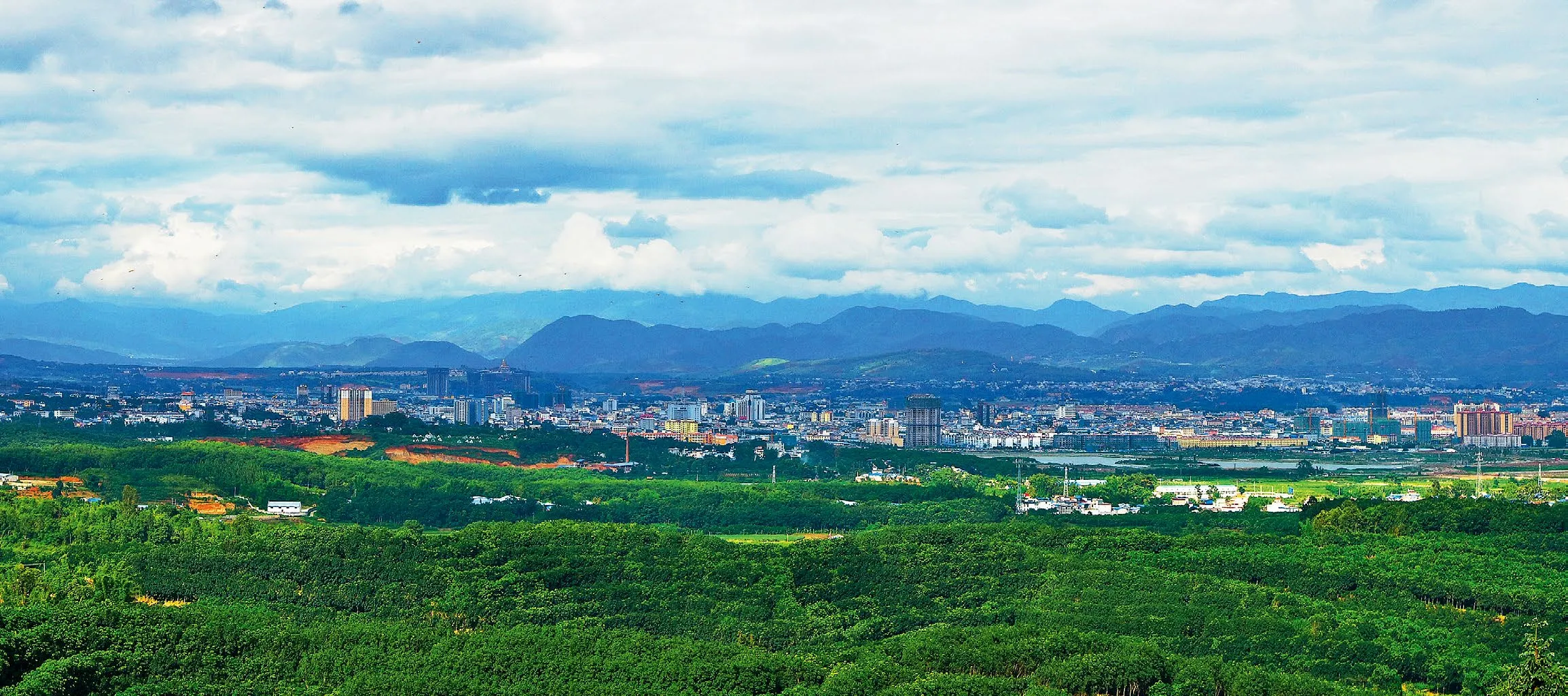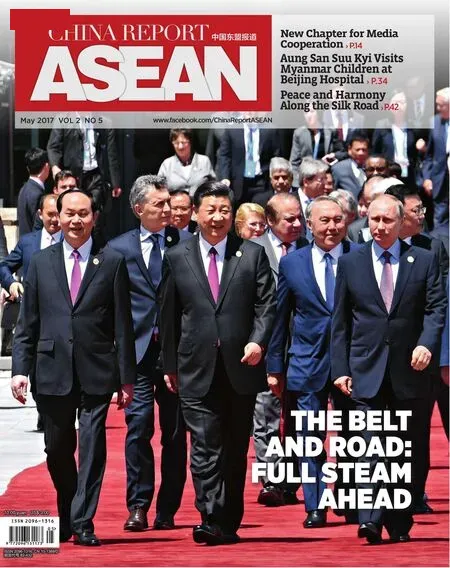Connectivity Leads To Prosperity
By
Connectivity Leads To Prosperity
ByYang Guanghe
Ruili on the China-Myanmar border blossoms in its role as a cultural and economic beacon in the region
Ruili, a county-level city of Dehong Dai and Jingpo Autonomous Prefecture in southwestern Yunnan Province, lies just across the border from Myanmar. It was once an important passage along the ancient Southern Silk Road, linking the southwestern regions of China with Southeast and South Asia. Ruili also serves as a frontier in the opening up of Yunnan Province.
The Jiegao Border Trade Zone, east of the Ruili River and four kilometers southeast of Ruili’s downtown, is the largest border trade port in Yunnan Province.“Jiegao” means “old city” in the language of Dai, an ethnic minority native to the region. The Jiegao land route directly connects with Muse, a nationallevel port of Myanmar.
Enjoying a long history, Ruili is known as “the cradle of Dai culture”, and was the capital of four ancient dynasties which controlled this region. The city also acted as an important courier station along the ancient Southern Silk Road, as well as a significant supply line during the War of Resistance against Japanese Aggression (1937-1945). The song “There Is A Beautiful Place”, describing the beauty of Ruili, was created by songwriter Yang Fei around the 1950's or 1960's, during his time in the city. In June 1992, China’s State Council approved Ruili as a border city for opening up, a change from its previous classification as a county. In February 1999, Wanding, northeast of Ruili, was granted approval by the StateCouncil to join Ruili, along with the establishment of the Ruili Wanding Economic Development Zone. In July 2012, the State Council approved plans to build up Ruili into a key experimental area for development and opening up.

Ruili has emerged as a key player in regional development.
Back in the 1980's, Ruili was the first border county to implement opening up, and its booming border trade has made Ruili unique. Ruili became a pilot for a number of China's later policies relating to opening up inland trade areas. Over the past more than 30 years since China first adopted the reform and opening-up policy in late 1978, Ruili has developed into an international trade and tourism city featuring border stability, rapid economic development and comprehensive social progress. Its geographic position makes it unique because Ruili, which borders Myanmar, shares Meng Mao Dam with Myanmar’s Muse and is close to Myanmar’s major cities, including Muse, Namhkam and Kyukok.
Several world-renowned peacock dance masters have come from Ruili, including Mao Xiang and Yue Xiang. The peacock dance, regarded as the most famous traditional folk dance of the Dai ethnic group, and the water drum dance of the De’ang ethnic group, have been both listed as China’s national intangible cultural heritage. The “Mu’nao’zong’ge Festival”, meaning “sing and dance together” in the Jingpo language, is the most important musical pageant for the ethnic group.
Water is of immense importance to the Dai people. In April each year, the watersplashing festival, which is also the New Year festival of the Dai people, is a traditional folk activity celebrated by locals in Ruili. People splash water on each other to pray for good fortune and safety during the festival. In October each year, China and Myanmar jointly conduct the China-Myanmar Pauk-Phaw Carnival in Ruili, which is aimed to promote the friendship and relations between China and Myanmar, as well as carry forward the national cultures of the two countries. Various folk activities including a bull cart competition, a beauty pageant, an ethnic costume contest and other traditional competitions of China and Myanmar are held at the carnival. In addition, the Myanmar-China Border Trade Fair has been held annually since 2001, the location of which switches between China and Myanmar each year.
Ruili is the largest inland border trade port in Yunnan, and an important gateway to Southeast and South Asia. Its advantages lie in its border trade zone, port, tourism and jewelry, and it is known as the birthplace of the peacock dance. Ruili also enjoys a reputation as an “Outstanding Tourism City in China”, the “Pearl of Ports” and an“Oriental Jewelry City”.
Ruili, the key experimental area for development and opening up, not only occupies a unique geographic position, but is also entitled to enjoy several preferential government policies. For instance, companies settled in the key experimental area, apart from industries which China prohibits or restricts, are exempt from paying corporate income tax for its first five years of operation to the local government, and is allowed a 50 percent reduction in corporate income tax to the local government for its second five years of operation. Thus, Ruili provides a sound environment for companies to develop.
Links
About Ruili:
Ruili enjoys convenient transportation and marks the final destination of China National Highway 320, which begins in Shanghai. Ruili is 99 kilometers from Mangshi City, the capital of Dehong Prefecture, and 890 kilometers from Kunming, the capital city of Yunnan Province. The total area of Ruili is 1,020 square kilometers, and it shares a 169.8-kilometer border with Myanmar in the northwest, southwest and southeast. The total population of the city is more than 170,000, including more than 20 ethnic groups such as the Dai, the Jingpo, the Lisu, the De’ang and the Achang. Ruili has a warm and humid subtropical climate with an annual average temperature of 20.7 degrees Celsius. Thanks to the mildness of its climate, flowers bloom throughout the year.
Ruili’s preferential policies:
Ruili’s special policies for innovative companies and individuals include a scientific research and innovation award. The city government encourages academics and experts to establish academic workstations in the city. Apart from the incentive funds given by higher level governments, Ruili will reward enterprises which are successful in their application for the establishment of the “Academic Workstation,”“Grassroots Workstation for Experts” or “Master Studio” grants with cash incentives of 300,000 yuan (US$44,104), 200,000 yuan (US$29,402.7) and 150,000 yuan (US$22,052), respectively. For a company which has successfully applied for the establishment of the prefecture-level “Academic (Doctor) Expert Workstation” or “Innovation Team”grants, Ruili will award it with a one-time 50,000 yuan (US$7,350.7) or 30,000 yuan (US$4,410.4) grant.

